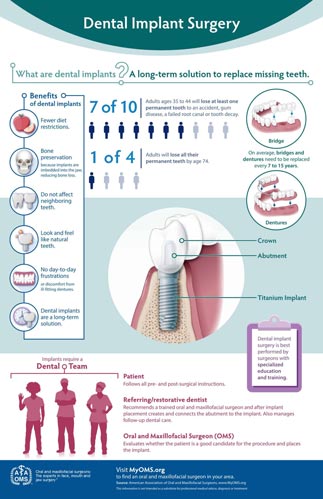Dental Implants
About Dental Implants
Dental implant procedures are changing the way people live. The replacement teeth look, feel, and function like natural teeth, enabling patients to eat virtually anything. Implants also help preserve facial structure and prevent bone deterioration that occurs when teeth are missing.

What Are Dental Implants?
The dental implants themselves are tiny titanium posts that are surgically placed into the bone where teeth are missing. These metal anchors act as tooth root substitutes. The bone bonds with the titanium, creating a strong foundation for artificial teeth. Abutments, that look like small posts, then allow artificial teeth to be attached to the implant.
Dental Implants Can Last a Lifetime
Dental Implants vs. Bridges
The Surgical Procedure
Dr. Alvarado performs in-office implant surgery in a hospital-style operating suite. This is especially beneficial for patients who have special medical or anesthetic needs or for those who need extensive bone grafting from the jaw, hip, or tibia.
Patients receive single-stage implants, which eliminate a second procedure to uncover them. For most, the dental implants (the titanium tooth root posts) and teeth extractions are performed in one surgical procedure.
After the implant is placed, a healing abutment (a temporary screw that extends beyond the gumline) is placed on top of the implant to promote healing and contour the gum tissue. The implant heals in approximately six weeks. At this time, patients return to the office for a quick evaluation and clearance to proceed with the restorative (nonsurgical) phase.
The process for patients with poor quality bone or insufficient volume of bone is a little different. Instead of having the abutment placed the same day as the implant surgery, they wait for the implant to heal beneath the surface of the gum. After the implant has bonded to the bone, the abutment is placed.
When front teeth are involved, temporaries are made to maintain an aesthetic appearance. Each patient is evaluated individually for the most appropriate choice.
When the artificial teeth are placed, the implant components are not seen. Most patients experience minimal disruption in their daily life. In most cases, patients can easily return to work the following day. Postoperative discomfort is considered minimal.
Dental implant placement is a team effort between an oral and maxillofacial surgeon and a restorative dentist. Dr. Alvarado performs the implant surgery, extractions, and bone grafting, if necessary, while the restorative dentist (the patient’s dentist) fits and makes the permanent prosthesis.

Surgical Advances
To provide you with a better understanding of dental implants, we have provided the following multimedia presentation. Many common questions pertaining to dental implants are discussed.
Frequently Asked Questions
Why dental implants?
Dental implants were developed more than 35 years ago by a Swedish scientist and orthopedic surgeon, Dr. Per-Ingvar Branemark. With his pioneering research, millions of individuals facing the frustration and embarrassment of tooth loss can enjoy a lifetime of renewed comfort and self-confidence.
What types of prosthesis are available?
A single prosthesis (crown) is used to replace one missing tooth — each prosthetic tooth attaches to its own implant.
A bridge can replace three or more teeth and may require only two or three implants.
A complete dental prosthesis replaces all the teeth in the upper or lower jaw, and the number of implants varies depending upon which type of complete prosthesis (removable or fixed) is recommended. A removable prosthesis (over denture) attaches to a locator abutment. (Think of a locator abutment as a ball-shaped trailer hitch.) A fixed prosthesis is permanent and removable only by the dentist.
Why select dental implants over more traditional types of restorations?
- A bridge that is supported by a tooth has reduced function and a limited lifespan.
- Removable partial dentures can cause problems: sore gums, difficulty chewing and speaking, looseness, food lodging under the partial, breakage, and poor fit due to gum shrinking or tooth loss.
- They can be inconvenient to remove at night.
- They can be embarrassing when they slip and fall out.
Are you a candidate for implants?
Candidates for implants undergo a thorough mouth exam and review of medical and dental history. If the mouth is not ideal for implants, there are ways to improve the procedure’s outcome, such as bone grafting.
What type of anesthesia is used?
Most dental implants and bone grafts are performed in the office with local anesthesia, with or without nitrous oxide or IV sedation. Most patients elect IV sedation because of the comfort and peace of mind.
Do implants need special care?
Once the implants are in place, they will last a lifetime with proper care, which includes good oral hygiene (brushing and flossing) and regular appointments with dental specialists. If needed, other healthcare issues are addressed to maximize the success of the procedure and the lifespan of the implants.

